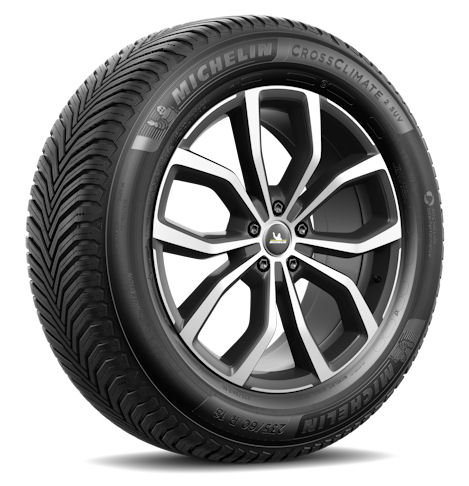Michelin debuts CrossClimate 2 SUV
 CrossClimate 2 SUV (Image: Michelin)
CrossClimate 2 SUV (Image: Michelin)
The latest Michelin all-season tyre for SUVs has been launched in European markets. Arriving from 1 May, Michelin says the CrossClimate 2 SUV is targeted at “drivers seeking a safe ride first and foremost, regardless of the SUV category.” It adds that this “new generation of four-season tyres” combines “multiple performances” and allows drivers to “contend with the majority of weather conditions, no matter the season.” CrossClimate 2 SUV is available at launch in 40 dimensions for 17- to 20-inch rim diameters.
Introducing its new product, Michelin claims that testing of the CrossClimate 2 SUV when in a new condition and when worn to the legal tread depth limit shows that the tyre is “the leader for braking on snow, and on dry and wet ground, as well as for traction on snow.” The tyre maker commissioned a series of tests with TÜV SÜD Product Service in which the new Michelin tyre was evaluated against the Bridgestone Weather Control A005Evo, Continental AllSeasonContact, Goodyear Vector 4 Seasons SUV Gen-3 and Pirelli Scorpion Verde All Season SF.
Michelin shares that CrossClimate 2 SUV stopped 5 metres shorter than average on snow, an average of two metres shorter in the wet (tyres at the legal wear limit), and also stopped shorter than average on dry surfaces. Compared to the competitor average, the Michelin tyre also had close to 20 per cent more traction on snow.
More mileage thanks to MaxTouch
Longevity testing conducted by DEKRA on behalf of Michelin indicate that drivers can achieve an additional 5,000 kilometres or 3,100 miles from CrossClimate 2 SUV on average, compared to the aforementioned premium competitor tyres. Michelin credits this added mileage to the use of MaxTouch Construction technology and says the longevity was achieved while maintaining a high level of safety, even when at the legal tread wear limit and regardless of the weather conditions.
“By avoiding premature removal every season, the tyres are changed less often. Drivers can therefore control their budgets thanks to an extended tyre lifespan,” comments Michelin. “Less tyres to replace also means less material to be used and less waste generated for the planet.”




Comments